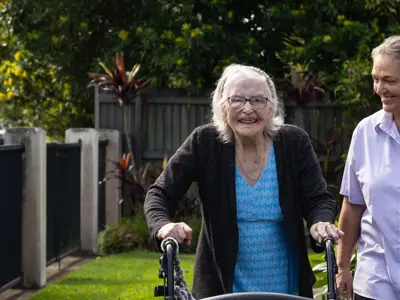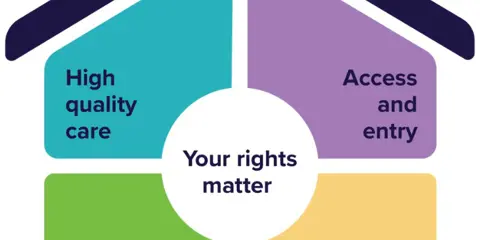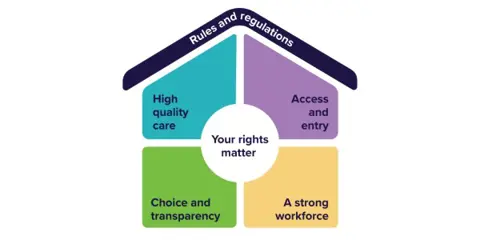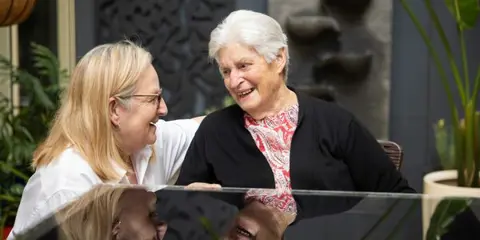
New Aged Care Act 2024
New Aged Care Act 2024
What do residents need to know?


A new chapter in Aged Care
A new chapter in Aged Care
Aged Care in Australia is constantly evolving to meet the needs of older people and their supporters. As part of this ongoing improvement, a new Aged Care Act has come into effect in 1 November 2025, bringing a fresh focus on dignity, choice, and respect for older Australians.
From the right to make your own decisions, to receiving safe, quality care that respects your background and preferences, this new framework puts older people firmly at the centre of care.
We encourage you to take a moment to explore these rights and understand how they support a more empowering and inclusive aged care experience.
Image source: Aged Care Act - Statement of Rights


For supporters
For supporters
Aged care continues to evolve to better support older people and those who care for them. As part of this progress, changes introduced on 1 November 2025 under the Aged Care Act 2024 have reshaped the role of families, friends and others who support older people.
From this date, refular and authorised representatives in My Aged Care are known as registered supporters. Older people and their representatives can choose to opt out of this new arrangement if they prefer.
The Act introduces a legal framework that promotes decision-making, while recognising the authority of appointed decision-makers under state or territory laws. These decision-makers must act within their legal scope, including those previously recognised under the Quality of Care Principles 2014.
To help supporters understand their responsibilities, the Department of Health has published a supporter handbook and case study. Additionally, a video guide for residents and families explains supported decision-making in practice.


Fees and funding
Fees and funding
From 1 November 2025, anyone moving into aged care is now part of a new fees and funding model introduced under the new Aged Care Act. These changes aim to make the system more transparent, with contributions tailored to each individual's financial situation.
The new model includes a Basic Daily Care Fee, a Means-Tested Contribution for living costs, and a Non-Clinical Care Contribution. Accommodation payments may also vary, with options to pay through a Refundable Accommodation Deposit (RAD), a Daily Accommodation Payment (DAP), or a mix of both.
To get a clearer idea of what your costs might look like, we recommend using the Fee Estimator on My Aged Care.


Language services to support older people in aged care
Language services to support older people in aged care
Older people who prefer to communicate in a language other than English can access free interpreting and translation services to help them understand and engage with aged care. TIS National offers 24/7 phone interpreting—just call 131 450 and state your preferred language. Aged care providers can also arrange this service on your behalf using their client code.
To make information more accessible, aged care providers can translate key materials into your preferred language. They may use the Department of Health, Disability and Ageing’s free translation service to create multilingual versions of printed and digital content, including Easy Read and plain English formats.
For older people who use Auslan or need captioning, the National Sign Language Program provides free support through Deaf Connect. This includes assistance with aged care services, social activities, and medical appointments covered by Medicare. To book, call 1300 773 803, email interpreting@deafconnect.org.au, or visit the Deaf Connect website.
Key Resources
-
New Aged Care Act resources is a central hub from the Department of Health with key information for older people about their rights, choices, and support under the new aged care system.
Older People | health.gov.au -
The Exploring Aged Care booklet is aimed at older people, their families and carers with important information about the changes to aged care.
Exploring aged care | health.gov.au -
Self-Advocacy toolkit, available through OPAN (Older Persons Advocacy Network), provides further information on how older can remain in the "driver’s seat" of their aged care decisions.
Self-advocacy toolkit | opan.org.au -
ELearning for older people, their families and carers is a 3-Module guide to help you understand the changes introduced by the Aged Care Act 2024.
eLearning for older people, their families and carers | health.gov.au -
Your guide to the Aged Care Act 2024 is a trainging package developed for facilitators to support them in conversations with older people, their families and carers.
Your Guide to the Aged Care Act 2024: Aligning to changes | health.gov.au
